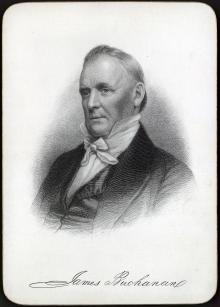- COVID-19 Project
- Home
- Archival Material
- College History Projects
- Subject-Based Digital Projects
James Buchanan (1791-1868)

James Buchanan, fifteenth president of the United States, was born near Mercersburg, Pennsylvania on April 23, 1791 to parents of Scotch-Irish descent. Buchanan attended the Mercersburg Academy until the fall of 1807, when he entered the junior class of Dickinson College. He found the school to be in "wretched condition" with "no efficient discipline." However, his own behavior while at Dickinson was far from exemplary; he was expelled during the fall vacation of 1808 for bad behavior. After making a pledge of good behavior to his minister, Dr. John King (a college trustee), Buchanan was readmitted to Dickinson. In his senior year, he felt slighted by the faculty because he did not win the top award of the College for which his literary society had nominated him. Buchanan commented, "I left college, . . . feeling little attachment to the Alma Mater."
Upon graduation, Buchanan began to study under the prominent Lancaster lawyer James Hopkins. After being admitted to the Pennsylvania Bar in 1812, he quickly gained prominence, and was elected to the Pennsylvania House of Representatives in 1814 and 1815 as a Federalist. Thus began Buchanan’s long career as a public servant. In 1820, he was elected to the U. S. House of Representatives. With the extinction of the Federalist party in 1824, he joined the Democrats. In Congress, Buchanan was an active opponent of John Quincy Adams and the Panama Mission. He supported Andrew Jackson in the election of 1828, and this support ultimately led to his appointment as the chairman of the Committee on Judiciary. In 1831, Jackson appointed him minister to Russia. On his return to the United States, Buchanan was elected to the Senate; he was reelected in 1837 and again in 1843. By this time, he had gained national prominence in the Democratic party; being passed over for a presidential nomination in both 1844 and 1848, he nonetheless served as Secretary of State under Polk and as minister to Great Britain under Pierce.
In 1856, Buchanan was finally nominated for the presidency, with John C. Breckinridge of Kentucky as his running mate. The campaign platform was based on the finality of the Compromise of 1850 and the non-intervention of Congress concerning slavery in the territories. Buchanan defeated Fremont in the electoral college, although he failed to get a majority of the popular vote. Buchanan's presidency was a stormy one, filled with controversy and numerous domestic difficulties. By the end of his term, the slavery issue and states' rights problems had caused serious divisions in government circles. The election of Abraham Lincoln added fuel to the fire, and between December 1860 and January 1861, numerous members of Buchanan's cabinet resigned. The attack on Fort Sumter on April 12, 1861 not only brought the start of the Civil War, but also seemed to cement the public’s opinion that Buchanan was one of the worst presidents in United States’ history.
James Buchanan retired to his estate, Wheatland, in Lancaster and died there on June 1, 1868.
Date of Post:
2005
College Relationship:
Alumnus/Alumna Class Year:
Honorary Degree - Year:
1842